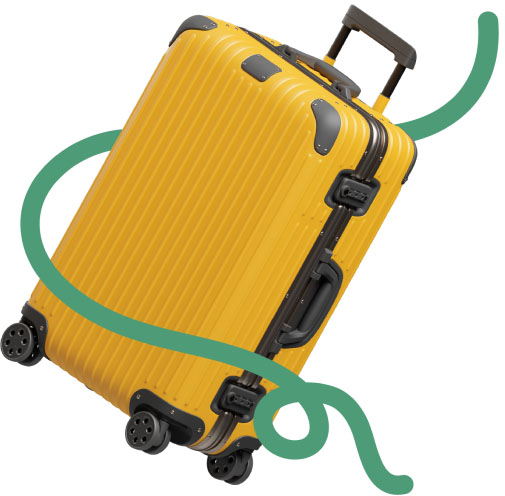Last updated on
What is the Montreal Convention?
The Montreal Convention regulates the civil liability of air carriers when passengers, baggage and/or cargo suffer damage in international air transport. All flights between the signatory countries are covered.
The treaty was originally drafted in Montreal back in 1999 and it was the first piece of legislation that determined what airlines should do in case of flight delays and cancellations, delayed or lost luggage incidents, and injury to or the death of passengers as a result of an accident. It has been ratified by 133 countries, including the Member States of the European Union.
What changed in 1999 with the signing of the Montreal Convention
The legislation contains a lot of new things when compared to its predecessor. One of the most important aspects is the transition to the concept of Strict Liability. Making clear that air carriers are strictly liable for what happens during their flights and the results of their operations meant that the burden of proof when claiming damages was not on the passengers anymore. This resulted in the fact that airlines are the ones that need to prove that they’ve tried their best to avoid disruptions and accidents in order to avoid being held liable for damages.
The new convention also modernised other aspects of air travel. For example, e-tickets and other travel documents were now allowed to be delivered digitally.
Was the airline responsible for your delayed or cancelled flight?
Flight delays and cancellations: care and reimbursement of expenses
Thanks to the Montreal Convention, if your flight is delayed or cancelled the airline is obliged to take care of you and your co-passengers. If you wait exceeds two hours, they need to provide you with food and beverages. If the disruption of your flight means that you’ll have to spend the night, even when caused by bad weather, the airline will have to pay your hotel stay as well as the transport to and from the airport. Finally, if you’ve incurred expenses due to the lack of care offered by the carrier, they are obliged to reimburse you. Take into account that you will have to provide itemised receipts for the expenses you intend to claim back.
So, in short, you are entitled to be cared for when your flight is delayed or cancelled and this includes:
- Food and drink
- Hotel accommodations (when necessary)
- Transportation to and from the airport
- Two means of communication (phone calls or emails)
- Reimbursement of incurred costs
Is there a limit? Yes! The airline can only be held liable for around 5,500 euros. Please remember to always keep a copy of your travel documents as well as the receipts of your expenses as otherwise the airline may not be obliged to reimburse you.

Compensation for delayed, loss or destruction of baggage
According to the treaty, you’ll be entitled to compensation if the airline loses, destroys or delays your luggage. The rules apply for both checked and hand luggage but they are a bit different. Time is of the essence here as you must submit your claim up to 7 days after your flight if you wish to be compensated for the problems.
One important thing to note is that if your luggage is delayed and, therefore, you’ve had to buy basic necessities, you have the right to be reimbursed for such expenses. Keep the receipt/invoice of your expenses as you must submit them as soon as possible to the airline.
How much money can I get in compensation for delayed, lost or destroyed luggage?
It depends on what you had in your luggage, the price of your piece of baggage and what has happened. As stipulated by the convention, the compensation may not exceed around 1,400 euros. If you are travelling with expensive items, you should inform the airline and perhaps purchase insurance as you’ll have to declare the value of the item and fill out a form if you’d like the airline to be held liable if they lose your luggage.
The most important thing if your luggage is delayed, lost or destroyed
Of utmost importance is that you do not leave the airport without filling out the corresponding forms and reports. As stated above, you only have 7 days to inform the airline about the problems with your luggage. Therefore, make sure that you’ve filled out a Property Irregularity Report (PIR) with all the relevant information regarding your incident and that you've submitted to the airline. You can do this at the baggage claim desk or at the check-in counter. The more detailed the better. Also, keep a copy (or a picture) of the report and the PIR’s reference number, this might be crucial later on.
Compensation in case of injury or death of a passenger
If a passenger has suffered an injury due to an accident, the airline will have to cover his or her medical costs associated with treatment. The total amount the airline may pay, sometimes in advance, is more or less 140,000 euros. This is also the sum the airline will have to pay to the family of a passenger that passes away due to an accident.
How long can I wait to claim my compensation or receive a refund?
When it comes to delayed, lost or destroyed luggage, you have only 7 days to fill out a PIR and let the airline know that there’s been a problem. Once they have acknowledged that they’ve lost or destroyed your luggage, you’ll be able to request the compensation you may be entitled to. So contact the airline before you leave the airport. Regarding compensation for injuries and reimbursement of expenses, you have up to 2 years after the date of your flight.
Which flights are covered by the Montreal Convention?
What can one do to claim compensation under the Montreal Convention?
Airlines normally have their very own procedures to deal with such issues. As it is the case with compensation for flight delays and cancellations, there will be incidents in which airlines will try to fob you off. In that case, you can contact a specialised service or head to the small claim courts in your country, your destination or the country in which the carrier is registered.
Remember that your rights under the Montreal Convention cover the following instances and amounts:
- Damages caused by flight delays or cancellations: up to 5,800 euros
- Delay, loss or destruction of luggage: up to 1,400 euros
- Injury or death of a passenger: up to 140,000 euros
The Montreal Convention uses Special Drawing Rights to determine the compensation you may receive. The amounts are reviewed every 5 years and also change according to exchange rates and inflation. So please take that into account when claiming from an airline.
Trust us with your claim!
We have more than 10 years of experience defending passengers' rights!
Claim now

What’s the difference between the Montreal Convention and EU 261/2004?
You can consider EU 261/2004 as an extension of the Montreal Convention. Both pieces of legislation are designed to protect your rights as an air passenger. However, the European Commission extended such protections back in 2004 when deciding that airlines should also compensate you for the time you’ve lost due to a cancellation or long delay. Back in 2009, the Sturgeon Ruling clarified that delays greater than 3 hours should be compensated in the same way as cancellations.
EU 261/2004 only covers flights operated by European carriers or flights within or departing from the European Union. It also establishes that you are to be compensated with 250, 400 or 600 euros depending on the distance covered by your flight and the time of your delay.
The main difference between both documents is that EU 261/2004 ensures that you are compensated for the time lost due to a flight disruption, not only reimbursed for the possible financial loss of having to deal with the consequences of a disruption or the delay, loss or destruction your luggage. In other words, the Montreal Convention focuses more on the damages that an airline may cause the passengers. In contrast, the European regulation considers a more abstract concept, that is indemnification for the loss of time.
I believe that my flight is covered by EU 261/2004, how can I find out?
You can easily check your flight for free with our claim calculator to find out if you can claim compensation.
If you then wish to, you can submit your claim with Flight-Delayed and we’ll take care of absolutely everything regarding claiming your compensation. Best of all, we’ll make sure that the airline pays what they are obliged to, even if that means that we have to sue them. All the legal costs will then be covered by our win fee. No risk and no extra costs. Learn more about how it works and submit your claim!
Claim flight compensation for your delayed or cancelled flight!
This can be done in less than 5 minutes online with our free Claim Calculator!
Claim now
A brief history of passenger rights and the Montreal Convention
The Montreal Convention, also known as MC99, is an important piece of the puzzle that is the aviation industry. Although the concept of passenger rights seems relatively new, the first convention regulating international air traffic is almost a century old.
Back in 1919, the first daily flight was presented to the world. A short flight between London and Paris. Shortly after, a connection between Amsterdam and London would be implemented shortly after. 10 years later, in 1929, the Warsaw Convention came to be. This old document would lay the foundation for international air travel. Its influence includes mandatory tickets, boarding passes, receipts for checked luggage, among other things. Liability in the event of injury or death was also introduced by the Warsaw Convention, 156 parties originally signed the treaty.
The treaty was modified on several occasions in order to accommodate changes that were happening inside the ever-growing aviation industry. Safety being of the utmost concern for everyone involved. The changes were made in the Hague in 1955 and then again in Guatemala City almost 20 years later. Trying to catch-up with the pace of the industry, signatory States and airlines decided that the document itself was outdated. In an effort to standardise air travel around the globe, the parties involved decided to draft a completely new treaty. As a result, the Montreal Convention was drafted and signed in 1999, replacing the already existing Warsaw Convention.



Did you like this content ?
Thanks you made our day!
Help us be better!
Well received, thanks!
